|
|
|
Sort Order |
|
|
|
Items / Page
|
|
|
|
|
|
|
| Srl | Item |
| 1 |
ID:
111535
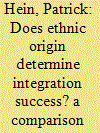

|
|
|
|
|
| Publication |
2012.
|
| Summary/Abstract |
The paper analyzes public policy and public opinion responses toward immigrants in Germany and Japan, two countries whose immigration policies have relied on blood purity (jus sanguinis). The paper retraces the rationale for jus sanguinis and contends that it was adopted at the turn of the century in both countries out of political convenience. The principles and goals of immigration policies are compared cautioning that better principles must not mean better outcomes.
It is reiterated that Germany has made a politically motivated move away from the ethnic monocultural concept, whereas Japan still hangs on more or less to the old model of silent and subtle assimilation. The more dissuasive Japanese model of tight immigration control, deportation and monocultural assimilation isthen compared to the more permissive German immigration model. A comparison of identity discourses in the form of Japanese Nihonjinron and German Leitkultur shows that both countries struggle with identifying and asserting their core values and that this has a negative impact on integration issues. The paper concludes that Germany has failed to bear the full consequences of its ambitious plans by taking into account the values, beliefs and worldviews of its immigrants, whereas Japan continues to treat immigrants as temporary guests denying any need for long-term integration.
|
|
|
|
|
|
|
|
|
|
|
|
|
|
|
|
| 2 |
ID:
105212


|
|
|
|
|
| Publication |
2011.
|
| Summary/Abstract |
This paper explores the policy choices of Germany and Japan for contributing to international security and stability in Afghanistan. Both countries have been closely involved with Afghanistan in the aftermath of the 9/11 attacks 2001. It is argued that the policy choice of Japan with a low military element and high civilian element differs significantly from the German military centered approach. An analysis of the goals and motives behind the foreign policy choices reveals that in Germany the military involvement has been justified with humanitarian reasons, national self interests and the right to "unlimited" sovereignty. This logic has ultimately led to the acceptance of civilian casualties and participation into offensive counterinsurgency operations. It is suggested that elite driven discourses have determined foreign policy strategy. In the case of Japan the paper claims that the conservative LDP elite had been pushing for intensified military involvement which materialized in the dispatch of military vessels to the Indian Ocean and ground forces to Iraq. Similar to Germany these moves towards gaining international reputation were rooted in domestic politics.
|
|
|
|
|
|
|
|
|
|
|
|
|
|
|
|
| 3 |
ID:
095474


|
|
|
|
|
| Publication |
2010.
|
| Summary/Abstract |
War reconciliation and cultures of memory themes continue to receive high attention but despite the long list of newly released books praising Germany which has been thought to be more prone to experience guilt and from it ensuing war responsibility for its past than the Japanese nation in the aftermath of World War Two [46], the long shadows of the past are still prevailing in both countries. Even if Germany scores better then Japan from a comparative perspective this does not mean that Germany has internally resolved the problems related to its past once and for all. Yet, the slave labor compensation legislation in Germany which was meant to definitely settle the accounts with the past has shown that lasting war reconciliation is possible. The unwillingness of Japanese Government officials to admit past wrongdoings, to apologize for coerced war prostitution and to refuse to compensate former slave laborers has put Japan on the frontline of international criticism. The claim that Japan as a nation has not learned from history is critically re-assessed against the backdrop of bottom up NGO reconciliation activities and lawmaker efforts to enact legislation aimed at resolving the comfort women issue. In contrast to conventional explanations it is argued that different circumstances, influenced by distinct historical and political factors in each country, resulted in different approaches. In Germany the social protest movements led to the institutional birth of the Green Party. The Greens initiated the reconciliation process for former slave laborers and changed the political landscape from the bottom. In Japan the social protest movements did not succeed to settle as a novel political force. Thoughtlessness, ignorance, conspiracy of silence, "double victimization" stigma, "negative pacifism" and the reluctance to address the war guilt issue prevented a public discussion. It is then sought to answer the question: Why do people repress or deny past wrongdoings despite knowing the facts? It is looked at how consecutive generations in Germany and Japan have coped with guilt and shame feelings in different ways. The article concludes that war reconciliation similar to restorative justice is an ongoing, never-ending process. The emotional part of reconciliation which goes far beyond words of apology, judicial punishment or monetary compensation and does not necessarily lead always to positive outcomes is given particular attention. Ways of civil society bottom-up reconciliation in Germany and Japan are explored.
|
|
|
|
|
|
|
|
|
|
|
|
|
|
|
|
| 4 |
ID:
092665
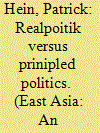

|
|
|
| 5 |
ID:
162426
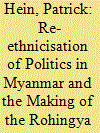

|
|
|
|
|
| Summary/Abstract |
In Myanmar, hostilities between the majority Burmese and the minority Rakhine people on one side and the minority Rohingya on the other side have been common, but violence has persisted and even increased during the unstable transition away from an authoritarian regime. Most Burmese citizens appear to be united behind the ruling elites on the Rohingya issue. Why is the violence assumed to be of ethnic origin and whose interests are served by the acceptance of such violent acts as routine events? The article attempts to seek answers by following Brass’s framework on Hindu–Muslim violence in India. Its purpose is to examine which actors, mechanisms and institutional developments have been dominant and significant in the re-ethnicisation of the political landscape in Myanmar and how this has consolidated the formation of a contentious and contested specific Rohingya group identity among many Arakanese Muslims.
|
|
|
|
|
|
|
|
|
|
|
|
|
|
|
|
| 6 |
ID:
151978
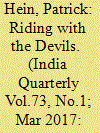

|
|
|
|
|
| Summary/Abstract |
Cambodia and Sri Lanka are two tiny states where China has no major strategic stakes. Yet China has been a key regime ally to both regimes at a critical moment during the alleged genocides of 1975–1979 in Cambodia and of 2009 in Sri Lanka. While the failure of Western interventionist peace-building models has been widely discussed, the patterns and outcomes of Chinese non-intervention have not. How did China’s scrupulous respect for non-intervention affect the alleged genocides? The article supports the viewpoint that Chinese non-interference in both states was built on the notion that the building of an independent nation was a top priority in securing sovereignty, order and unity. Hence, China focused on bilateral military aid and economic development, whilst shielding both governments from external scrutiny and international accountability during and after the alleged genocides. China has since made efforts to address and resolve national conflicts through concerted United Nations (UN) procedures and mechanisms.
|
|
|
|
|
|
|
|
|
|
|
|
|
|
|
|
| 7 |
ID:
098384
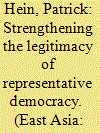

|
|
|
|
|
| Publication |
2010.
|
| Summary/Abstract |
bureaucracy, who acts on behalf of the executive, and party councils. Moreover bureaucrats bypass the legislative Diet process by making rules themselves. This is problematic because it is the lawmakers who are directly held accountable by voters for the enacted legislation risking to be eventually voted out of office. It is suggested that under the given circumstances of strict party discipline, drafting of bills by the bureaucracy and endorsement by party councils, the formal majority rule alone is not sufficient to justify legislative outcomes. The legitimacy factor is introduced to verify in how far individual lawmakers are enabled to initiate and draft floor bills by themselves, discuss bill contents in plenary deliberations and get the public opinion involved. The article attempts to demonstrate that bipartisan floor bills reflect the quest for parliamentary legitimacy and equality among lawmakers across party boundaries. It is suggested that the more legislators participate in drafting and discussing a bill the more legitimate the outcome becomes. The paper screens to this effect several bipartisan bills submitted to the Diet of Japan. Bills such as the NPO law, the law to ratify the Rome Statute for the accession to the ICC, the law to prevent suicide and the law to implement internet filters to protect children are the result of cooperation among lawmakers trying to constrain the interference of the executive or of the powerful bureaucracy. The participation of non-parliamentary agents taking an active part in the legislative process has enhanced the dynamics of representative democracy as well. In the decades of radical ideological confrontation in the 1950s, 60s, and 70s the majority rule risked to become an instrument of coercion. The opposition was compelled to resort to anti-parliamentary obstructionist tactics to derail majority legislation that was rammed through parliament without sufficient plenary deliberation and without taking into account the concerns or viewpoints of the minority. Obstructionism decreased with the LDP co-optation of opposition parties to government responsibility in the 1990s. Opposition for the sake of opposition (communists, DPJ until 2006) and governing for the sake of governing (SDPJ, Komei) have not been honored by the voters. After 2007 the DPJ started to refocus its policies more on ideological differentiation and managed to beat the LDP in the 2009 elections. Recently the work of the Diet has been increasingly put under the scrutiny of international NGOs and legislatures abroad. The unresolved controversial comfort women issue suggests that omission to pass appropriate and timely reconciliatory legislation can cause a serious loss of parliamentary institutional esteem and respect.
|
|
|
|
|
|
|
|
|
|
|
|
|
|
|
|
|
|
|
|
|